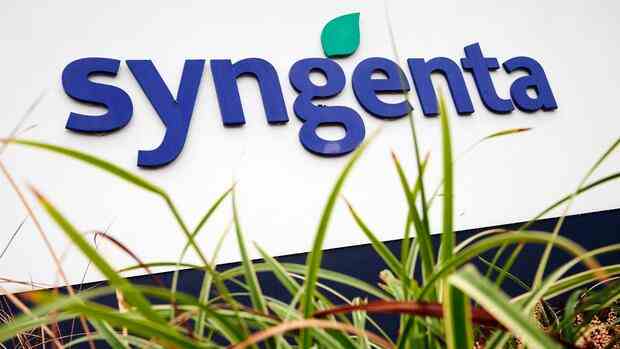Chemchina bought Syngenta in 2015 for $43 billion and took the company private.
(Photo: AFP)
Zurich, Dusseldorf The Chinese-controlled agrochemical group Syngenta significantly increased profits and sales in the past fiscal year. Revenues in 2022 increased by 19 percent compared to the previous year to 33.4 billion dollars, as the company, based in Basel, Switzerland, announced on Wednesday. Pre-tax profit (Ebitda) climbed 20 percent to $5.6 billion.
With these numbers, the Syngenta Group is gearing up for the upcoming IPO. Owner Chemchina had already planned this step for 2022, but postponed it due to delays by Chinese authorities and the difficult market environment for IPOs. The Chinese state-owned company wants to list Syngenta on the Shanghai stock exchange, with an option for a secondary listing in Switzerland, and is aiming for a valuation of more than 50 billion dollars.
In view of the recent bad mood on the financial markets, however, this goal is considered ambitious. The environment for IPOs has intensified with the global turmoil in the banking sector. Nonetheless, Chemchina is continuing to prepare for an IPO and has taken the next important step.
The Shanghai Stock Exchange has scheduled a hearing on the stock exchange plans for March 29. In financial circles, this is seen as a positive signal from the regulators. After that, the documents could quickly go to the Chinese stock exchange regulator and after their approval, an IPO could become concrete – possibly in the first half of 2023.
Chemchina bought Syngenta in 2015 for $43 billion and took the company private. The Chinese company then founded the Syngenta Group and brought its own crop protection, seed and fertilizer businesses under its roof. The group also includes the Israeli Adama, which specializes in imitation products of off-patent crop protection products.
In this constellation, Syngenta is the largest agricultural supplier in the world with sales of 33 billion dollars. In 2022, Bayer’s agricultural business had revenues of the equivalent of $27 billion. However, the Leverkusen-based company sees itself as the world market leader in the core business of agrochemicals, because this does not include the fertilizer business.
Advantage in the growth market of China
In the past fiscal year, the turnover of the Swiss increased more than that of the agricultural divisions of Bayer and BASF. However, this was partly due to exchange rate effects. The businesses of the two German competitors are still more profitable.
In 2022, Syngenta achieved a return on sales of 17 percent based on earnings before interest, taxes, depreciation and amortization (Ebitda). The Bayer agricultural division Crop Science came last year to 27 percent, at BASF this figure was 18 percent of sales, which was the equivalent of $ 11.1 billion.
With the new structure, Syngenta has some advantages in competition with the Germans: Even before the takeover, the Swiss were one of the leading suppliers in the USA and Latin America. In the two most important agricultural markets in the world, Syngenta grew between 13 and 20 percent in both crop protection products and seeds. The fact that there are Chinese owners behind Syngenta has apparently not impacted business in America so far.
>> Read also: How genetic engineering could protect agriculture from drought
Syngenta also has a clear advantage in the rapidly growing agricultural market in China. The Chinese also bought the Swiss company because they don’t want to leave the urgently needed modernization of their agriculture to Western companies.
As early as 2022, Syngenta was able to demonstrate its dominant position in China as a state-controlled company and grew by 17 percent. China is also currently opening up to the use of genetically modified crops to increase productivity, and Syngenta’s technology should help with this.
Bayer remains cautious for 2023
A possible IPO of Syngenta Group also depends on the situation and perspective of global agriculture. Farmers in the USA and Latin America in particular currently have sufficient funds for new investments and higher demand due to the significantly higher selling prices for corn, soybeans and wheat, according to the US agricultural company Corteva.
However, Bayer Crop Science remains cautious and expects growth of three percent for 2023. The main reason for this: The prices for the weed killer glyphosate – one of Bayer’s top products – will calm down again after the rapid increase in the past two years. The profit margin (Ebitda before special items) will therefore fall slightly to 23 to 25 percent.
Bayer is already aiming for a record profit margin of 27 to 29 percent for 2024, as Chief Agricultural Officer Rodrigo Santos recently explained in an interview with the Handelsblatt. Syngenta did not give a forecast for the current year on Wednesday. However, due to the uncertain macroeconomic environment, the Swiss have increased their reserves.
More: Jeff Rowe takes over Syngenta’s crop protection division and positions himself as CEO successor
